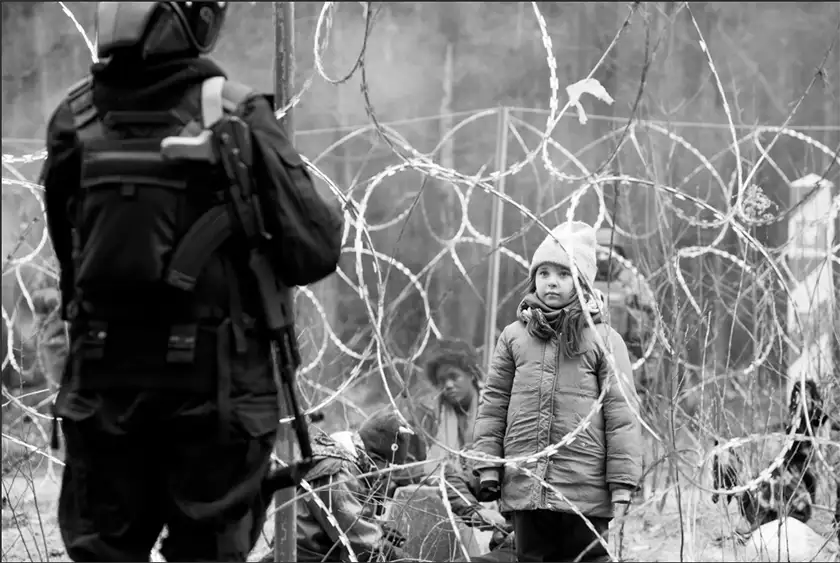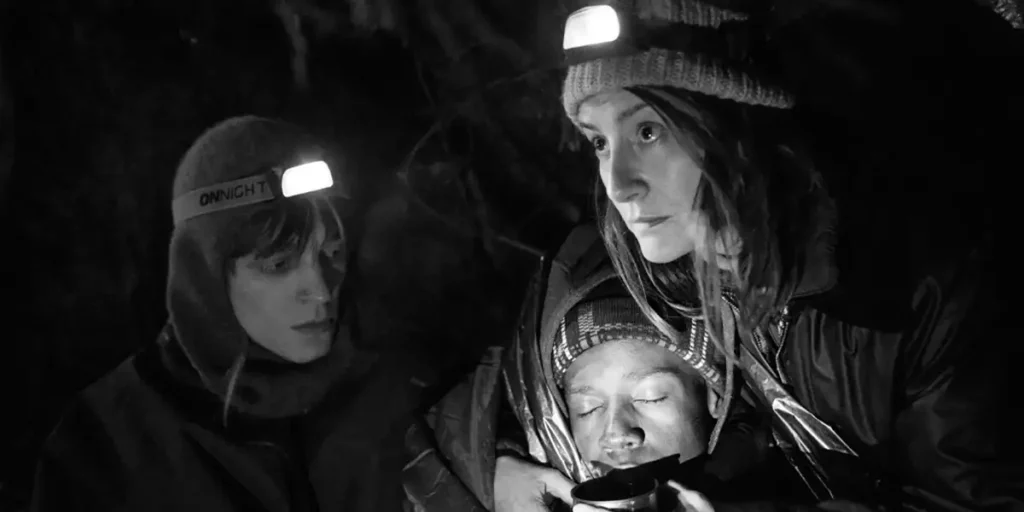Green Border, Agnieszka Holland‘s drama about the refugee crisis on the Belarus-Poland border, is a necessarily tough watch.
Director: Agnieszka Holland
Genre: Drama
Run Time: 152′
US Release: June 21, 2024 in theaters in NY; June 28, 2024 in LA
UK & Irish Release: June 21, 2024 in cinemas
Last year’s Venice Film Festival saw the arrival of two refugee dramas from European filmmakers. The first was Matteo Garrone’s Oscar-nominated Io Capitano. The second was Green Border (Zielona Granica) from Polish director Agnieszka Holland (Europa Europa), which is based on real experiences and won a Special Jury Award at Venice.
It also earned the ire of the (right-wing) Polish government, with one minister likening Green Border to “Nazi propaganda.” That is an unjust attack on a film that portrays Poland in a rather critical light, delving into the recent European refugee crisis and not flinching away from the cruelty of the situation. It is a tough watch, but necessarily so.
The film starts in October 2021 when Alexander Lukashenko, the authoritarian leader of Belarus, opened his country up to refugees from the Middle East and North Africa seeking asylum in Europe. One Syrian family has heard this promise. Bashir (Jalal Altawil), wife Amina (Dalia Naous), children Nur and Ghalia (Taim and Talia Ajjan), their baby and Bashir’s father (Mohamad Al Rashi) lost everything in their country’s war. Now, they hope to take advantage of this safe route through Belarus into the EU and Sweden. Amina calls it “a gift from God.” Little does she know that her family have been caught in the middle of a geopolitical game.
A minibus picks them up, along with an Afghan woman named Leila (Behi Djanati Atai), and sends them through the Polish border. Then they are found by troops who promptly shove them back into Belarus alongside others trying to make the journey. It turns out that Lukashenko’s promise was merely propaganda, an attempt by him and Russia to weaken Poland and the EU (one Polish official later calls it “classic hybrid warfare.”) Yet in this back-and-forth, humans will be caught in the crossfire.
The title of Green Border refers to the border between Belarus and Poland, a boggy swamp that Bashir’s family are forced to cross through again and again. Their initial journey in the first act has creeping tension and uncertainty about what awaits them. That soon gives way to vicious indifference and violence that Holland displays in shocking detail. There is an immediacy to the film, from its geopolitics to how these groups are used and painted as weapons (referred to in one instance as “bullets” rather than people).

But as one character makes clear, these are refugees rather than migrants. They have all been forced to flee their home countries, whether it was because of ISIS or the Taliban. Now, they have become pawns in this intentionally hostile system.
Green Border is grounded in reality, which means it employs a simple and stripped-down visual style. Although it starts with a shot of the lusciously green, tree-filled zone from above, the film immediately goes from colour to monochrome. It is a choice that Holland says was made to evoke reels from WWII and the Holocaust (perhaps making this a case of history repeating itself). This documentary style is reinforced by DP Tomasz Naumiuk, who previously worked on Claire Denis’ High Life. His handheld camerawork becomes shaky during moments of panic and bodies rushing.
However, the most interesting aspect is how Holland – with support from Kamila Tarabura and Kasia Warzecha, and co-writers Maciej Pisuk and Gabriela Łazarkiewicz-Sieczko – widens the scope of her film to show the consequences of this crisis. She starts by focusing on Bashir and his family but then latches onto the human stories that can be found everywhere, and how they interconnect. We follow Jan (Tomasz Włosok), a new border guard trying to do what he feels is his national duty whilst preparing for his wife Kasia (Malwina Buss) to give birth to their daughter. We follow a group of activists who find the refugees, bring them aid and asylum applications and film their stories (they won’t take them any further though, fearing consequences from the Polish government).
And we follow Julia (Maja Ostaszewska), a widowed psychiatrist who finds two named characters in danger and then joins the cause. Here is a normal civilian uninvolved in this crisis at first, who becomes willing to do absolutely anything to save these people. She turns out to be a surrogate for Holland’s message. Against an uncaring government and the notion of passiveness, the only way to help these refugees is through direct action, no matter the personal risk.
The main feeling in Green Border is one of anger, with Holland shining a light on the inhuman actions of those in power and how they contribute to the suffering of others. It is a story partly of radicalisation and resistance, designed to radicalise and persuade its audience. That is why so much time is devoted to the perspective of the white, middle-class Julia (despite her subplot being arguably the least engaging). And that is why the epilogue draws on Russia’s invasion of Ukraine, where Ukrainian refugees were widely accepted into Poland. To Holland, the hypocrisy and xenophobia is undeniable.
It is a bleak and brutal experience – perhaps too brutal by the end. But it is also an effective one, with fleshed-out characters and stories that intersect well. And Holland tries to find and present compassion alongside her anger at how refugees are treated. We see the toll the journey takes on Bashir and his family, and we see the small moments of triumph and hope.
Green Border will be released in theaters in New York on June 21, 2024 and in LA on June 28, and in UK & Irish cinemas on June 21.

